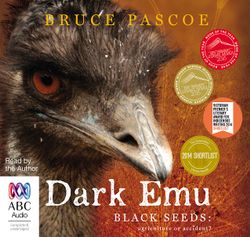A completely accessible, compelling and riveting account of pre-invasion Aboriginal agricultural systems.
Dark Emu argues for a reconsideration of the 'hunter-gatherer' tag for pre-colonial Aboriginal Australians and attempts to rebut the colonial myths that have worked to justify dispossession.
Accomplished author Bruce Pascoe provides compelling evidence from the diaries of early explorers that suggests that systems of food production and land management have been blatantly understated in modern retellings of early Aboriginal history, and that a new look at Australia’s past is required.
This title is in stock with our Australian supplier and should arrive at our Sydney warehouse within 1-2 weeks of you placing an order.
Once received into our warehouse we will despatch it to you with a Shipping Notification which includes online tracking.
Please check the estimated delivery times below for your region, for after your order is despatched from our warehouse:
ACT Metro 2 working days
NSW Metro 2 working days
NSW Rural 2-3 working days
NSW Remote 2-5 working days
NT Metro 3-6 working days
NT Remote 4-10 working days
QLD Metro 2-4 working days
QLD Rural 2-5 working days
QLD Remote 2-7 working days
SA Metro 2-5 working days
SA Rural 3-6 working days
SA Remote 3-7 working days
TAS Metro 3-6 working days
TAS Rural 3-6 working days
VIC Metro 2-3 working days
VIC Rural 2-4 working days
VIC Remote 2-5 working days
WA Metro 3-6 working days
WA Rural 4-8 working days
WA Remote 4-12 working days




Share This Audio CD: